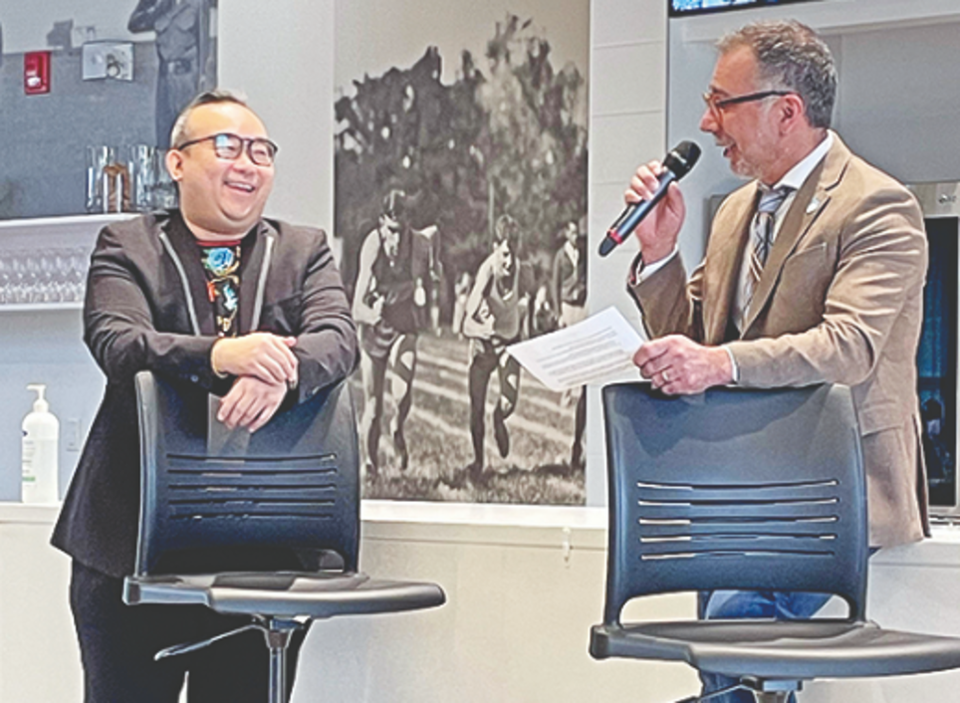If necessity is the mother of invention, the global pandemic may have been a close relative to innovation for Aurora resident Keith Loo.
Loo, in partnership with Dr. Colin Hong, launched Skinopathy in August 2020 with plans to develop artificial technology to help people screen for skin cancers not only from the comfort of their own home, but from the convenience of their phone as well.
Its intention was to help people with skin cancers get diagnosed and treated early in a medical environment where wait times for appointments can make all the difference.
As the technology developed, its success with patients was clear, and now the duo are in talks to expand the program to local hospitals.
The local success story of Loo and Hong was the focus of the inaugural Emerging Aurora event, an initiative of the Aurora’s Economic Development Board.
Held at the historic Aurora Armoury April 19, it was a chance for members of the community to bring together what economic development manager Lisa Hausz describes as the local “entrepreneurial ecosystem together in one spot in collaboration” to support one another.
“This event wrapped around health care and technology and came out of our target sector analysis…in early 2021,” she said. “Health care technology was part of that discovery of where Aurora could play a significant role and start attracting and supporting entrepreneurs in that space. Later on in 2021, we also had industry roundtables and as part of that we had some speakers and one of those was Keith Loo [who proposed] how the town could support tech innovation and entrepreneurship.
“Skinopathy is a young company that started in the midst of the pandemic. Within 18 months or so, they have really grown. We were able to promote him and the type of technology we have growing in Aurora [and] do outreach and say, ‘Here’s how we can support tech-preneurs.’”
Loo describes himself as a “recent resident” of Aurora.
His partner on Skinopathy, a plastic surgeon, was seeing more and more late-stage cases of skin cancer and together they set out to see if technology could be created to screen for cancer early.
“Your typical doctor screens for cancer at 67 per cent accuracy and your typical specialist screens for cancer at 87 per cent accuracy,” says Loo. “[This technology] was actually more accurate than doctors, and we did this together with Dr. Hong. The challenge was, so what if we could screen for cancer? In Canada, the posted wait times across the country was 25 weeks…to get any kind of help. We decided we can’t just give people technology to tell them they have skin cancer; we have to build something to help them with their specific cancer and that’s what we did.
“We built a company with a whole bunch of technologies around it in 2020 and today we have seen about 4,000 patients. We have over 250 doctors who refer their patients to us and we know that we have saved quite a few lives because patients tell us that.
“Beyond that, we have reduced wait times for any skin condition significantly. The fastest we’ve been able to help any patient is they found us online, they did a skin screening, they did a virtual consultation, and then they came into the doctor’s office to remove the cancer – and that was four hours in total time.”
As a successful entrepreneur in the field who teaches entrepreneurship at the Schulich School of Business, Loo says he is looking forward to continuing to be a part of Emerging Aurora and helping other businesses and businesspeople find their footing.
“[It’s about] how can we help build Aurora into an innovation and health care hub,” he says. “I felt each conversation I was having [was] how can we work together? How can we showcase the emergence of Aurora as a start-up hub? The number one thing now is we have to make things easier for start-ups and small businesses, and businesses in general, to engage.
“I am going to continue working with Aurora to attract start-ups, to attract businesses and offer mentorship.”
Adds Hausz: “The (entrepreneurial) ecosystem has existed and this is really being able to point entrepreneurs in the right direction and get them connected to the right people based on where they are; if they are brand-new and starting up, do they need a location, connection, [or] start-up funding? Or are they like Keith’s company and they need that next step in connecting to a wider ecosystem?”
Brock Weir is a federally funded Local Journalism Initiative reporter at The Auroran
